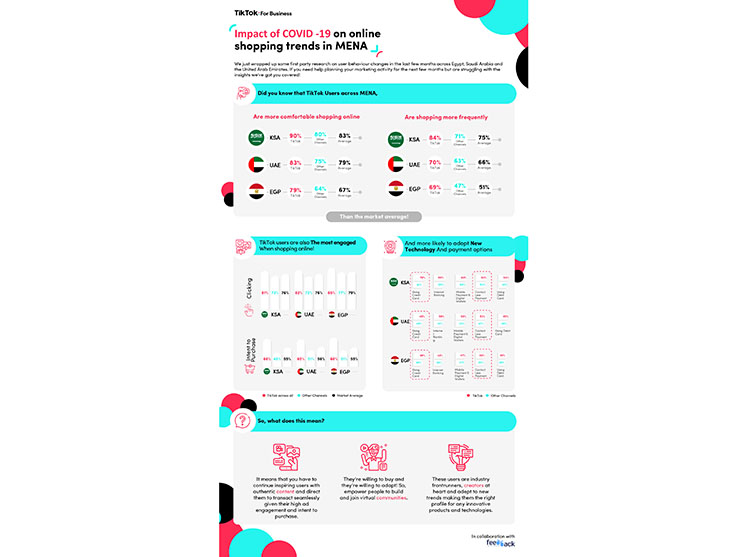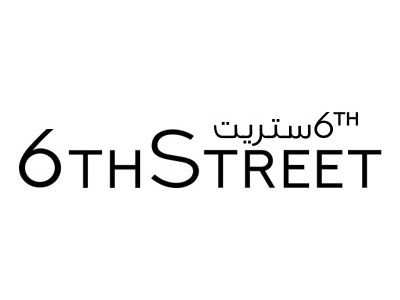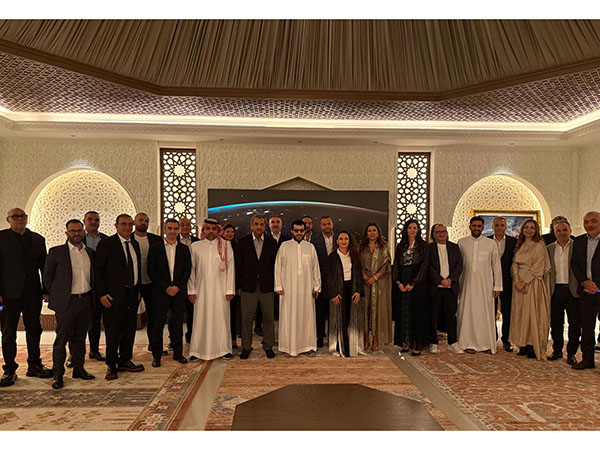News - News In Brief
New study from TikTok For Business shows behavioral shifts towards online shopping across its Middle East audience
November 4, 2020

TikTok, the short-form mobile video, has partnered with Feedback Market Research – a UAE research company, to bring to light the impact of COVID-19 on online shopping behavioral shifts amongst users of the TikTok platform in the region.
The TikTok commissioned study, covering KSA, UAE and Egypt, highlights spending behavior amongst its early tech adopter audience and how they have accelerated the shift to online purchasing and contactless payments.
“2020 has been a year of constant change and with change, comes huge insights and learnings for us all. With this in mind, and as a unique marketing platform with a thriving community, we wanted to better understand the changing consumer behaviour in the region in relation to online shopping to help our partners to drive engagement and achieve their goals” said Shant Oknayan, General Manager of Global Business Solutions (MENAT).
“What this study has shown is a huge spike in the frequency of online shopping across markets and our TikTok users are leading the charge when it comes to digital adoption. TikTok users have a higher potential to purchase online when compared to users of other channels, this is due to them having an experimental mindset and a willingness to test new approaches such as a cashless economy before others do so,” adds Shant.
Online shopping continues to rise, and TikTok audience shop the most
Whilst consumers are settling and adapting to a ‘new normal’, they are naturally spending a lot more time at home and as a result the internet has become their preferred starting point to begin their purchasing journey – further driving a spike for online shopping and the demand for convenience at their doorstep.
The new study unveils that a whopping 90% of the surveyed TikTok users in KSA, 83% in the UAE, and 79% in Egypt have increased their online shopping habits this year. When compared to other channels KSA (80%), UAE (75%) and Egypt (64%), TikTok users are more comfortable to shop online further signaling their quick adaptation to the circumstances.
When it comes to the frequency of shopping, this is now at an all-time high across markets – 84% of TikTok users in KSA, 70% in UAE and 69% in Egypt now shop online at least once a month. TikTok users over-index across the board and are more affluent with a higher income bracket compared to users on other channels.
When it comes to advertising, consumers are inundated with the volume of ads on digital platforms. However, TikTok users indicated a willingness to click on an ad with a higher intent to purchase, with 66% of users in KSA, 65% in UAE and 68% in Egypt saying that an ad has persuaded them to proceed with a purchase, compared to users on other channels KSA (48%), UAE and Egypt (51%) . Further demonstrating the uniquely active and highly engaged users on the TikTok platform.
Use of credit card and contactless payment have increased significantly
Unsurprisingly, every form of payment except cash has seen a massive surge in utilization as a result of COVID-19. More and more consumers now prefer contactless modes of payment and the old barriers to online shopping have all but been obliterated.
When looking at the shift in the use of new technologies and payment options, TikTok users are more open to using these methods of payments. 70% of KSA TikTok users are now using credit cards to pay for purchases and 63% have shifted to contactless payment. Whereas, in UAE 45% of TikTok users now use credit cards and 53% rely on contactless payments. In Egypt, the adoption of credit cards for online payments stands at 48% and contactless payments reach 42%.
While online payments and contactless cards have accounted for a minority of payments in the past, the pandemic has driven consumers to change their behavior and companies/brands to accelerate their adoption of the technology to meet consumer demand.













